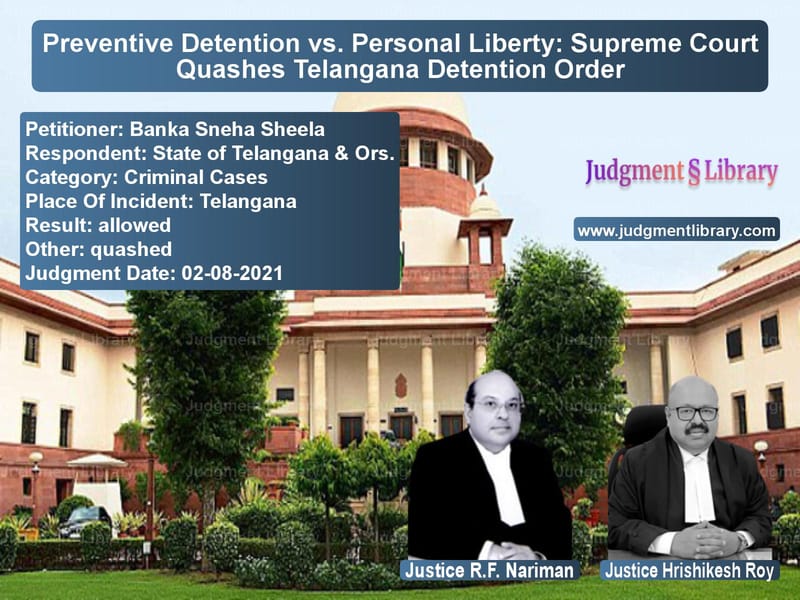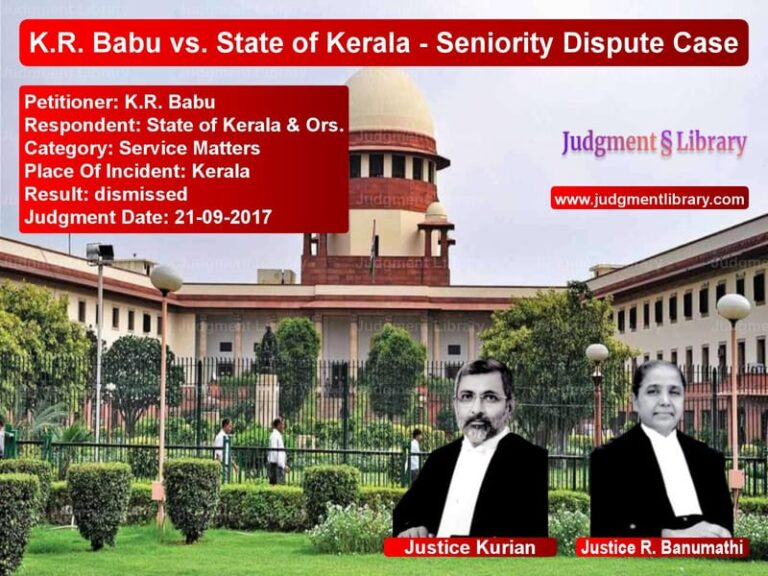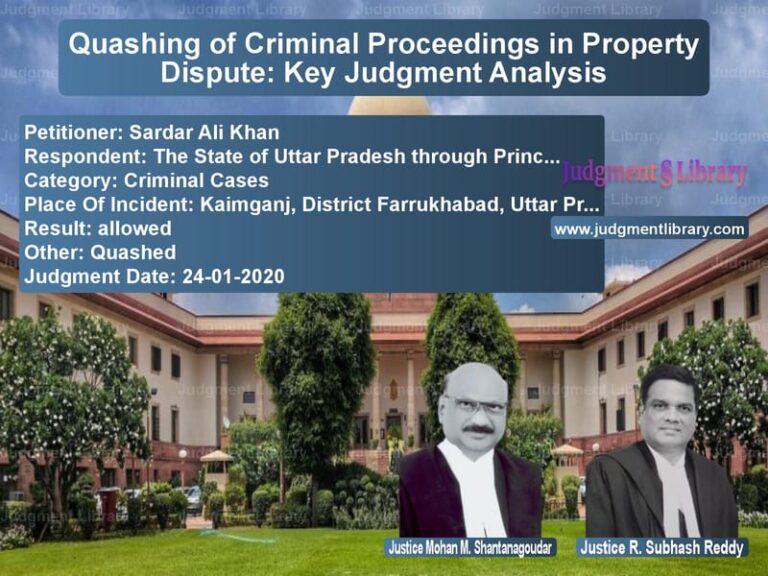Preventive Detention vs. Personal Liberty: Supreme Court Quashes Telangana Detention Order
The case of Banka Sneha Sheela v. State of Telangana & Ors. is a landmark judgment where the Supreme Court scrutinized the preventive detention laws in India and reaffirmed the constitutional safeguards for personal liberty. The Court quashed the detention order issued against the petitioner’s husband under the Telangana Prevention of Dangerous Activities Act, 1986, highlighting that preventive detention cannot substitute ordinary criminal proceedings.
Background of the Case
The controversy arose when the State of Telangana issued a preventive detention order against the petitioner’s husband, referred to as ‘the detenu,’ under Section 3(2) of the Telangana Prevention of Dangerous Activities Act on 28.09.2020. The detention was based on five FIRs filed against him between 2017 and 2019 under Sections 420 (Cheating), 406 (Criminal Breach of Trust), and 506 (Criminal Intimidation) of the Indian Penal Code.
The allegations revolved around financial fraud where the detenu had introduced himself as a High Court advocate and lured victims into investing in stock market schemes with the false promise of high returns. He allegedly assured investors of guaranteed profits and convinced them to transfer substantial sums of money into his bank accounts. However, when they sought their returns, he threatened them instead of repaying.
Key Allegations Against the Detenu
- The detenu operated an elaborate scheme promising a 100% return on investments.
- He posed as a legal professional with a network of Chartered Accountants and Company Secretaries.
- Victims transferred funds via online banking and digital wallets based on false assurances.
- When investors asked for their returns, the detenu allegedly threatened them with dire consequences.
- The financial fraud amounted to over Rs. 50 lakhs.
Petitioner’s Arguments
The petitioner, the wife of the detenu, challenged the detention order on several grounds:
- The cases against the detenu fell under financial fraud, which is a ‘law and order’ issue rather than a ‘public order’ concern required under preventive detention laws.
- The last offense alleged in the FIRs was from December 2019, but the detention order was issued in September 2020, showing no immediate necessity.
- Since the detenu had been granted bail in all cases, the State could have pursued cancellation of bail instead of preventive detention.
- Preventive detention is meant for habitual offenders or those who pose an immediate risk to public peace, which was not the case here.
- The State misused preventive detention laws as an alternative to regular criminal prosecution.
Respondent’s Defense
The State of Telangana defended the detention order, arguing that:
- The detenu was a habitual fraudster who repeatedly defrauded people.
- His activities instilled fear among investors and discouraged them from engaging in stock market transactions.
- Ordinary criminal laws were insufficient to deter him from committing further offenses.
- His release on bail made it highly probable that he would engage in similar fraudulent activities.
High Court’s Decision
The High Court of Telangana upheld the detention order, ruling that the detenu’s actions disturbed public order by undermining trust in financial transactions and creating insecurity among investors. The court reasoned that since financial fraud impacts the economy and affects a large section of society, preventive detention was justified.
Supreme Court’s Analysis
The Supreme Court, however, disagreed with the High Court’s reasoning. The key findings of the Court were:
- The detenu’s actions, though criminal, did not amount to a ‘public order’ disturbance as required under preventive detention laws.
- Preventive detention cannot be justified solely because the accused was granted bail in criminal cases.
- The appropriate legal remedy for preventing further offenses was to apply for bail cancellation, not preventive detention.
- The nine-month gap between the last alleged offense and the detention order indicated a lack of urgency.
- There was no material evidence to prove that the detenu’s activities posed an immediate threat to public peace.
Important Observations from the Judgment
The Supreme Court reaffirmed the distinction between ‘law and order’ and ‘public order.’ It cited several landmark cases to highlight that preventive detention is an extraordinary measure and should not be used in ordinary criminal cases.
The Court stated:
“The mere contravention of law such as indulging in cheating or criminal breach of trust certainly affects ‘law and order,’ but before it can be said to affect ‘public order,’ it must affect the community or the public at large.”
The judgment further emphasized:
“The preventive detention law should not be used merely to clip the wings of an accused involved in a criminal prosecution. It is not intended for the purpose of keeping a person under detention when under ordinary criminal law it may not be possible to resist the issue of orders of bail.”
Final Judgment
The Supreme Court quashed the preventive detention order, holding it unconstitutional. The Court ruled:
- The detention order violated the constitutional rights guaranteed under Article 21 (Right to Life and Liberty) and Article 22 (Protection Against Arbitrary Detention).
- The detenu must be released immediately.
- The State should rely on normal criminal laws rather than misusing preventive detention statutes.
Impact of the Judgment
The judgment reaffirmed the fundamental principles of personal liberty and due process in preventive detention cases. It serves as a crucial precedent ensuring that:
- Preventive detention laws are not misused as a substitute for regular prosecution.
- The distinction between ‘law and order’ and ‘public order’ is maintained in legal proceedings.
- Courts continue to safeguard citizens’ rights against arbitrary state action.
This ruling strengthens the legal framework protecting individual liberties and ensures that preventive detention remains a tool of last resort, used only in cases of immediate and significant public threat.
Petitioner Name: Banka Sneha Sheela.Respondent Name: State of Telangana & Ors..Judgment By: Justice R.F. Nariman, Justice Hrishikesh Roy.Place Of Incident: Telangana.Judgment Date: 02-08-2021.
Don’t miss out on the full details! Download the complete judgment in PDF format below and gain valuable insights instantly!
Download Judgment: banka-sneha-sheela-vs-state-of-telangana-&-supreme-court-of-india-judgment-dated-02-08-2021.pdf
Directly Download Judgment: Directly download this Judgment
See all petitions in Bail and Anticipatory Bail
See all petitions in Fraud and Forgery
See all petitions in Judgment by Rohinton Fali Nariman
See all petitions in Judgment by Hrishikesh Roy
See all petitions in allowed
See all petitions in Quashed
See all petitions in supreme court of India judgments August 2021
See all petitions in 2021 judgments
See all posts in Criminal Cases Category
See all allowed petitions in Criminal Cases Category
See all Dismissed petitions in Criminal Cases Category
See all partially allowed petitions in Criminal Cases Category







